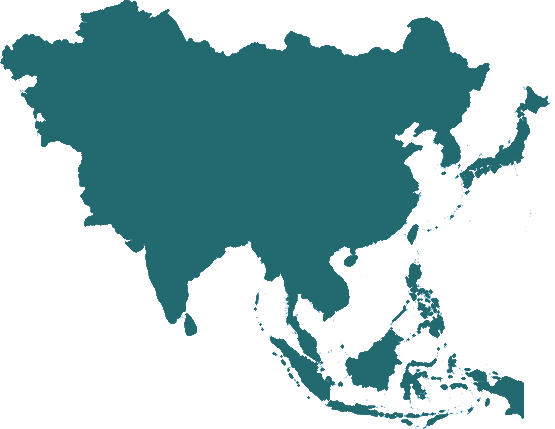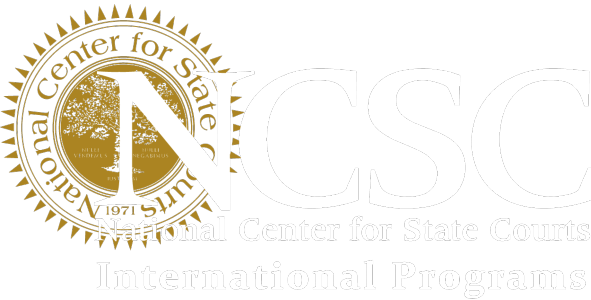
Strengthening the Rule of Law and Advancing Access to Justice
For twenty years, NCSC has partnered with host country governments, civil society organizations, and development partners in Asia to strengthen the rule of law and advance access to justice for all. Our programs improve administration of courts and legal aid systems, promote judicial branch education, and improve justice outcomes for citizens.
Azerbaijan Legal Database Project (June 2004 – April 2006)
The purpose of the Legal Database Project was to improve access to legal resources by making the country’s legal framework documents available through mediums accessible to the public at large– including by Internet and CD-ROM– with the intent of making Azerbaijan’s governing legal documents available to the public and the governance of the state more transparent.
Program results
- The entire body of framework documents was collected and converted by the NCSC office in Baku to a digitized format, creating metadata records for each document.
- The necessary information technology infrastructure required to maintain and update the new database was developed.
- A comprehensive training program for personnel responsible for sustaining the database was implemented.
The Azerbaijan Legal Database Project was funded by USAID and implemented by NCSC.
Bangladesh Strengthening Rule of Law Program (September 2018 – September 2020)
The focus of the Countering Terrorism through a Strengthened Rule of Law FrameworkProgram is to increase the capacity of courts in Bangladesh to adjudicate terrorism, terrorism financing, and money laundering cases. The Program works with justice sector stakeholders to create a unified judicial practice by increasing awareness, training judges, improving efficiency and case processing, and creating judicial resources focused on counterterrorism and complex financial crimes. The Program will be implemented in collaboration and partnership with the Law and Justice Division of the Ministry of Law, Justice and Parliamentary Affairs. In addition, the Program will also work with the Supreme Court, the Judicial Administration Training Institute (JATI), the Solicitor Wing, the Anti-Corruption Commission, the Bangladesh Bar Council, and judges, prosecutors, and court staff across Bangladesh.
Program objectives
- A guideline will be developed, aimed at improving trial date certainty, trial date preparedness, trial continuity, and the mitigation of risk and impact of adjournments.
- Training and capacity building needs will be identified; new training programs for judges focused on understanding, managing, and adjudicating terrorism and financial crime cases will be created; best practices workshops will be held with judicial stakeholders; institutional capacity of JATI will be strengthened.
- Numerous resources will be developed, including a Judicial Practice Digest, a Terrorism and Complex Financial Crimes Bench Book, and an Orientation Package for newly assigned judges to Anti-Terrorism Special Tribunals.
- Modernization efforts will be bolstered through IT trainings and addressing equipment needs.
The Strengthening Rule of Law Program is a two-year initiative funded by the U.S. Department of State, Bureau of Counterterrorism and implemented by NCSC.
Bangladesh Increasing Access to Justice Program (July 2019 – July 2021)
The focus of the Access to Justice (A2J) Program is to improve the delivery of legal aid services, increase judicial self-governance, and increase citizen awareness of legal rights and responsibilities. The Program works with legal aid stakeholders including District Bar Associations, District Legal Aid Committees, and the National Legal Aid Services Organization to provide training and resources to defense attorneys, increase legal aid committee capacity building, and increase public awareness of legal aid services. JFA will be implemented in collaboration and partnership with the National Legal Aid Services Organization (NLASO), District Bar Associations, District Legal Aid Committees, local Upazilas and Unions, and universities.
Program objectives
- Training opportunities for attorneys will be created, concerning best practices in topics including legal drafting, court procedures, trial advocacy, witness examination, and criminal law and procedures.
- A standardized evaluation system for attorneys will be developed, with the goal of improving client satisfaction and attorney responsiveness
- With the help of the District Bar Associations, the establishment of mentoring programs between junior and senior defense attorneys will be facilitated.
- With the help of government legal aid providers, NGOs, police officers, prison officials, and other criminal justice stakeholders, a client referral strategy will be developed for the provision of legal aid services.
- A public awareness strategy will be developed to inform the public of legal rights and available legal aid services. Schools and universities will teach students about legal rights and access to legal aid services.
The Access to Justice Program is a two-year initiative funded by INL and implemented by NCSC.
Bangladesh Justice For All Program (October 2012 – September 2018)
USAID’s Justice for All (JFA) Program sought to facilitate access to justice for all citizens and empower vulnerable populations, especially women and the poor, to exercise their rights effectively. JFA improved the delivery of legal aid in the formal justice sector, increased judicial self-governance, and increased citizen awareness of legal rights and responsibilities. Working at the national level and in 15 pilot Districts, JFA fostered collaborative partnerships with Government of Bangladesh (GOB) counterparts and civil society partners to achieve shared objectives in the demand and delivery of legal services to citizens. JFA strengthened government legal aid services, promoted court excellence, increased legal literacy, and empowered women professionals and law students.
Program results
- Women professionals were empowered through the implementation of a Women in Justice Initiative that provides professional development opportunities for women judges and lawyers.
- Legal aid services and legal aid committees were strengthened to double legal aid case intake by the end of the program, and management capacity as well as the quality of services provided to justice seekers was improved.
- Increased understanding of judicial governance and court excellence resulted from increased assistance to the Supreme Court and District Courts
The Justice For All Program was a six-year initiative funded by USAID and implemented by NCSC.
Indonesia Justice Sector Reform Program (February 2007 – December 2009)
The focus of the Justice Sector Reform Program in Indonesia (JSRP) was to work with the Attorney General’s Office (AGO) to support modern and accountable prosecutorial services. NCSC supported programming related to the Supreme Court and the public education and communication initiatives for the AGO. NCSC also supported the organizational reform of the AGO and the creation of a training center.
Program results
- NCSC’s International Framework for Court Excellence–– a tool that assesses a court’s performance against certain areas of excellence and provides guidance for courts to improve their performance–– was shared with the Reform Team of the Supreme Court.
- Continued legal education opportunities were supported for prosecutors so that they may advance technical and leadership skills.
- Content for the AGO website was created and redesigned.
The Justice Sector Reform Program for Indonesia was funded by USAID and implemented by the Asia Foundation in partnership with NCSC.
Indonesia Anticorruption and Commercial Court Enhancement Project (In-ACCE) (November 2005 – September 2009)
The In-ACCE Project’s focus was to develop, in a limited number of model courts, practices and solutions that can be replicated in other courts. Working closely with the model courts, the In-ACCE achieved these outcomes through various targeted activities and interventions, including application of modern court administration practices; introduction of court automation and streamlined case processing; promotion of standardized recordkeeping, forms and court practices; provision of training and education programs; and pursuit of legal reforms. These activities were designed to meet the objectives of the Blueprint and Action Plan for the Commercial Court and the Blueprint for the Anticorruption Court as well as emerging international standards.
Project results
- Determined the nature and extent of modifications necessary to implement a Case Management System in Indonesian courts
- Laid the foundation for developing case management software by developing the Case Management System scope of work, database structure, and development environment
The In-ACCE Project for Indonesia was funded by USAID and implemented by Booz Allen Hamilton in partnership with NCSC.
Strengthening the Independence of Malaysia’s Judiciary Program (September 2019 – March 2021)
The Strengthening of the Independence of the Malaysian Judiciary Program (SIMJ) is designed to build Malaysian consensus for and commitment to judicial reform measures advancing judicial independence and accountability. SIMJ will collaborate with Malaysian judicial leaders, governmental actors, and civil society in support of a judicial reform agenda, including possible improvements to the process of judicial appointments to Malaysian Superior Courts, conducted by the Judicial Appointments Commission (JAC). The JAC is a central institution to ensuring integrity in the judiciary through its judicial governance and selection powers. The membership of the JAC includes several of the highest judicial officials in Malaysia. The Program will also help identify other judicial reform initiatives that can strengthen judicial independence and accountability and increase public trust and confidence in the Malaysian judiciary.
Program goals
- Analyze the judicial selection process against regional and international best practices, including relevant judicial reform issues and challenges and develop a draft report (roadmap) for reform alternatives
- Socialize the roadmap with judicial leaders, government officials, and civil society to build support for a Malaysian-led reform agenda
- Build the capacity of civil society to lobby for changes in support of a judicial reform agenda through public outreach and awareness activities
SIMJ is funded by the U.S. Department of State, Bureau of International Narcotics and Law Enforcement Affairs (INL) and implemented by NCSC.
Under a sub-contract with Chemonics International, Inc., NCSC provides short-term technical assistance and study tours for Myanmar government institutions to strengthen judicial administration.
Mongolia Judicial Reform Program (January 2001 – May 2009)
The goal of the Judicial Reform Program (JRP) in Mongolia was to provide long-term support for the judiciary of Mongolia by supporting the implementation of a long-term Strategic Plan––designed by justice sector stakeholders working with international organizations including USAID and NCSC–– to modernize the justice system and strengthen the rule of law. This Strategic Plan became a roadmap for justice reform efforts in Mongolia throughout the decade. Throughout the program’s lifespan, NCSC recommended changes to the country’s legal framework, built training capacities, raised ethical standards, introduced modern court management practices, and increased public awareness about the workings of the justice system.
Program results
- The first-ever Case-flow Standards for Mongolia were adopted as a result of efforts to improve case management practices for civil and criminal cases.
- Significant improvements were made in order to modernize and upgrade the judiciary’s information technology systems.
- Recommendations to Mongolian counterparts were provided, regarding drafting and implementing new legislation; identifying issues and responding to requests for advice and assistance; and advising on the drafting of the “Law on Courts.”
The Judicial Reform Program in Mongolia was funded by USAID and implemented by NCSC.
Sri Lanka CORE Justice Program (October 2018 – December 2019)
Under a sub-contract with Chemonics International, Inc, NCSC provided support for technology planning on behalf of the program, which seeks to address gaps in frameworks, capacities, and resources that prevent a more effective and modern justice system.
